| Srl | Item |
| 1 |
ID:
086131
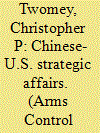

|
|
|
|
|
| Publication |
2009.
|
| Summary/Abstract |
Many aspects of the Chinese-U.S. relationship are mutually beneficial: some $400 billion in trade, bilateral military exchanges, and Beijing's increasingly constructive diplomatic role. There are other grounds for concern. Each side's militaries view the other as a potential adversary and increasingly make plans and structure their forces with that in mind.
On the conventional side, there are many important areas to consider, but the potential for nuclear rivalry raises monumental risks. This article assesses the dangers in the bilateral nuclear relationship, the potential for traditional arms control to address these challenges, the broadening of the "strategic" military sphere, and the issue of proliferation beyond the bilateral relationship.
|
|
|
|
|
|
|
|
|
|
|
|
|
|
|
|
| 2 |
ID:
086467
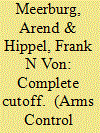

|
|
|
|
|
| Publication |
2009.
|
| Summary/Abstract |
President Barack Obama has pledged to "lead a global effort to negotiate a verifiable treaty ending the production of fissile materials for weapons purposes."[1] Fissile materials are the chain-reacting fissionable materials that are the essential ingredients in nuclear weapons, in practice, highly enriched uranium (HEU) and separated plutonium. Obama is not the first president to back the negotiation of such a treaty: President Bill Clinton did so after the UN General Assembly in 1993 adopted by consensus a resolution calling for negotiation of a "non-discriminatory, multilateral and internationally and effectively verifiable treaty banning the production of fissile material for nuclear weapons or other explosive devices."[2] Even the administration of President George W. Bush tabled a draft treaty at the Geneva-based Conference on Disarmament (CD), albeit without international verification.
|
|
|
|
|
|
|
|
|
|
|
|
|
|
|
|
| 3 |
ID:
086130
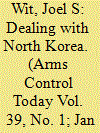

|
|
|
|
|
| Publication |
2009.
|
| Summary/Abstract |
U.S. presidents have struggled with the challenges posed by a hostile North Korea since the end of the Korean War and with the dangers of a nuclear North since the mid-1980s. The diplomatic struggle over Pyongyang's nuclear weapons program has had many ups and downs, from the near outbreak of a second war in 1994 to an agreement a few months later to end the nuclear program, from the prospect of a visit to Pyongyang by President Bill Clinton in 2000 to the breakdown of the 1994 agreement in 2002 and the North Korean nuclear test in 2006, from limited arrangements over the past few years that have constrained Pyongyang's plutonium production program to recent disputes over verification.
|
|
|
|
|
|
|
|
|
|
|
|
|
|
|
|
| 4 |
ID:
086129


|
|
|
|
|
| Publication |
2009.
|
| Summary/Abstract |
If Iran goes nuclear, so too will more of its neighbors, or so says the established wisdom.
It is a logical deduction given the extent to which Egypt, Saudi Arabia, and Turkey feel a need to maintain power and political parity with Iran and the security concerns that Persian Gulf countries already harbor about the would-be regional hegemon to their northeast. If any of them follow Iran or if Israel abandons its policy of nuclear opacity, the domino effect could spread further and include counties, such as Algeria, that have sparked proliferation concerns in the past.
A proliferation cascade in the Middle East is not a foregone conclusion. Adroit policy choices and practices by the Obama administration can build a bulwark against a Middle East nuclear tipping phenomenon.
|
|
|
|
|
|
|
|
|
|
|
|
|
|
|
|
| 5 |
ID:
086127
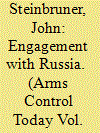

|
|
|
|
|
| Publication |
2009.
|
| Summary/Abstract |
The U.S. security relationship with Russia is a matter that is more significant to the U.S. government and the American people than was apparent during the presidential election. Elections are primarily about attitudes. The exercise of power is about the management of consequences.
As Barack Obama assumes the burdens of the presidency, he will acquire direct responsibility for the fact that the nuclear deterrent force operated by Russia represents by far the greatest physical threat to the United States and the only one that might plausibly put the viability of our society into immediate question. He will need to be continuously aware that he alone bears direct responsibility for managing that situation under our constitutional system. No one can contest or share his exclusive authority on the basis of experience, institutional position, personal stature, or anything else.
|
|
|
|
|
|
|
|
|
|
|
|
|
|
|
|
| 6 |
ID:
086468
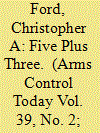

|
|
|
|
|
| Publication |
2009.
|
| Summary/Abstract |
The Obama administration has stated its intention to conclude a treaty cutting off production of fissile material, highly enriched uranium (HEU) and plutonium, for nuclear weapons. So did the administrations of George W. Bush and Bill Clinton. Although a fissile material cutoff treaty (FMCT) has been a key objective of the UN Conference on Disarmament (CD) for many years, that organization seems unable to break out of its now customary paralysis.[1] This experience should encourage the Obama administration, if indeed it wants such a treaty, to look to another forum for realization. More importantly, it may be vital for the new U.S. administration to take a different approach because pursuit of an FMCT as currently contemplated at the CD might well have the ironic and presumably unintended consequence of gravely undermining the nuclear nonproliferation regime. Fortunately, such a new approach may well be available.
|
|
|
|
|
|
|
|
|
|
|
|
|
|
|
|
| 7 |
ID:
086464
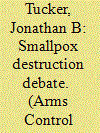

|
|
|
|
|
| Publication |
2009.
|
| Summary/Abstract |
One of the longest and most contentious international policy debates has swirled around the question of whether to destroy the last known stocks of the smallpox (variola) virus, which are preserved at two World Health Organization (WHO)-authorized repositories in Russia and the United States. Although smallpox was eradicated from nature more than three decades ago, concerns surfaced in the early 1990s that a few countries may have retained undeclared samples of the virus for biological warfare purposes. Because a smallpox outbreak would be a global public health emergency of major proportions, in 1999 the WHO approved a research program at the two authorized repositories to develop improved medical defenses against the disease.
|
|
|
|
|
|
|
|
|
|
|
|
|
|
|
|
| 8 |
ID:
086132


|
|
|
|
|
| Publication |
2009.
|
| Summary/Abstract |
Historian Barbara Tuchman described the trail of misperceptions and bad decisions that led to mankind's worst self-imposed disasters as a "March of Folly." Now is the time for India and Pakistan to take steps to ensure that another war or crisis between them does not result in a nuclear exchange that destroys both societies.
The prospects for rolling back India's or Pakistan's nuclear weapons programs during the Obama administration are zero. Nevertheless, the administration can help reduce the risk of nuclear war in South Asia. There is a growing recognition by New Delhi and Islamabad that a crisis, triggered by events such as the November terrorist attack in Mumbai, could escalate out of control and result in an unintended nuclear exchange. The Kargil crisis in 1999 and the 2002 cross-border attack on the Indian parliament brought the two nuclear rivals to the brink of war. Having survived two Cuban missile crises of their own, it is time India and Pakistan take steps to manage the risks inherent in their tense nuclear relationship.
|
|
|
|
|
|
|
|
|
|
|
|
|
|
|
|